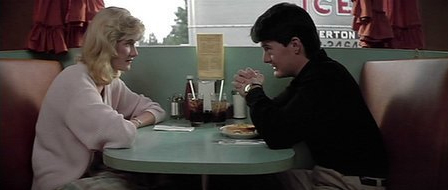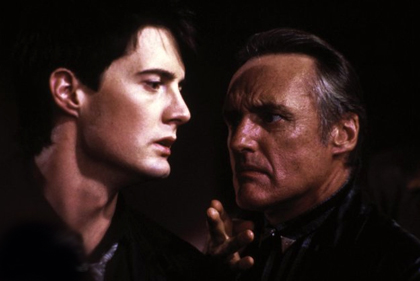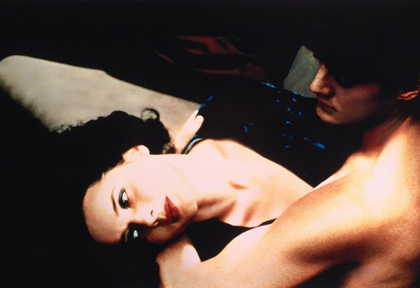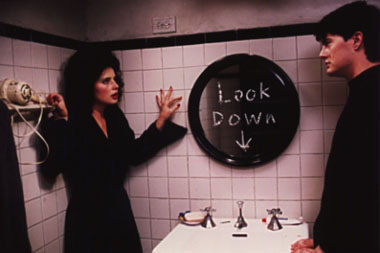
 |
|
|
|
MGM has brought out Blue Velvet on a fancy special edition disc before, but this 25th Anniversary reissue was partly prompted by a discovery last year by archivist Darren Gross, an employee of the company that now handles film management and preservation for MGM. Darren located for Blue Velvet what David Lynch has been looking for for a quarter century -- the scenes that were cut when he made trims to bring the film down to a contractually-obligated two-hour running time. Lynch was so pleased to prepare them as a special extra that he included Darren in the publicity push for the new release. 1 
David Lynch doesn't believe in revising his work, and he never intended to put the cut scenes back into Blue Velvet. It is a stunning film, perhaps David Lynch's best. Other filmmakers have imitated Lynch's disturbing mix of Americana and unspeakable evil, but the Lynch World remains compelling because of his unique artistic attitude. Even his much-maligned blockbuster Dune is an artistic triumph on the personal level. Blue Velvet, with its name cast and genre roots, is still the work of an experimental filmmaker. The film proposes that every calm hometown hides a sinister underworld. College comes to an abrupt halt for Jeffrey Beaumont (Kyle MacLachlan) when his father suffers a heart attack, and he returns to his hometown of Lumberton. After finding a severed ear in a vacant lot and being warned not to be curious by Detective Williams (George Dickerson), Jeffrey nevertheless investigates on his own with the help of Williams' daughter Sandy (Laura Dern). Jeffrey sneaks into the apartment of sultry singer Dorothy Vallens (Isabella Rossellini), and opens the lid of a horrible underworld of human evil. Soon he is shadowing the verminous criminal Frank (Dennis Hopper). The extremes of vice and cruelty Jeffrey witnesses from afar become an addiction -- and he personally involves himself with the traumatically disturbed Dorothy. Then Jeffrey falls into the clutches of the murderous Frank, and must pay for his curiosity with a harrowing ordeal... For many viewers, David Lynch is the movie equivalent of turning over a rock in search of obscene horrors hidden below. This is a very scary, very strange movie, with Dennis Hopper playing a remarkably perverse, intimidating villain. The weird thing about Lynch is that, while somewhat glamorizing the vice and ugliness that inhabit his fantasies, he is clearly equally inspired by the 'sweet side' as well. Part of the "disillusion factor" of Blue Velvet is that Jeffrey Beaumont's introduction to the perverse underworld is seen as a necessary step to appreciate and understand the misleadingly 'normal' straight world. A reluctant college dropout, Jeffrey is an interesting audience surrogate -- thoughtful, slightly disaffected, and curious to see more of the truth in life, especially the underworld of sin and sensations that aren't to be found in his comfortable but predictable homelife. For Lynch, a hero is somebody eager to challenge his own senses. I can imagine David Lynch shouting, 'YES!' when seeing Repulsion. Ian Hendry recoils from the sight of a dead body, shudders, and then leans back in close, slowly, to give it a good look. Jeffrey Beaumont doesn't want to be afraid of life, of the horrors that become nightmares if we don't take a good hard look to see them for what they are. 
Inside this seamy underworld, Blue Velvet presents a scary vision of human obscenity, centered mainly on the unstable, demented Frank, a villain whom actor Dennis Hopper claimed he was born to play. Spouting forth frighteningly vicious profanities and rattlesnake violence, Frank is what we in the straight world call one sick puppy. Monsters roam the earth, Lynch says, committing horrible acts to indulge cruel desires. Frank represents that bad guy so terribly bad he's impervious to all influences, let alone the law ... he's the guy you don't want to meet up with, even in broad daylight. "It is by will alone that I set my mind in motion." It is by talent and style alone that Lynch keeps Blue Velvet from becoming pointlessly exploitative. Isabella Rossellini's performance as the tortured, suicidal sex slave Dorothy is truly remarkable. Her crumbling mental state and sexual confusion elicit contradictory feelings: Dorothy's 'affair' with Jeffrey is a fearful mix of desperation, rage, and erotic hope. You know you're seeing something of substance, and not exploitation rubbish, and Lynch manages to keep Dorothy and Jeffrey from becoming pornographic ciphers. For it seems clear that Lynch's aim in expressing his own sick sex fantasies, is to find their humanity. That doesn't mean that Blue Velvet is meant for any other than viewers equally adventurous as Jeffrey -- this is not one to bring home to Mom. For Lynch-0-philes, it's the mother lode of Lynchian Lore, especially for fans of the television show Twin Peaks, which is clearly an extension of the Velvet universe. Lumberton has its logs, its coffee shop, its squeaky-clean High School and its ultra shady nightclub. Garish grotesques like Dean Stockwell's painted, primping, Roy Orbison-singing Ben stalk the periphery. He and the inhuman creatures played by Lynch regs Jack Nance and Brad Dourif seem to inhabit a different planet altogether. 
On the moral side there's the delightful Laura Dern, whose Sandy ends up sharing Jeffrey's nightmare without losing sight of her rosy, joyful fantasies. But there's also her detective father, who seems to have strangely adapted himself to the horrors of his profession. Sandy's mother (Hope Lange) is also a distinct characterization; a 'sheltered housewife' strong enough cope with her husband's world and yet find a friendly smile for guests like Jeffrey. I knew several women with her resilience, but they don't show up often in movies. The most mature thing about Velvet is how Lynch handles Jeffrey's attitude toward his traumatic adventures. Surely we question Dorothy's ability to recover. Is Jeffrey cured of his morbid curiosity? Will he become like the slightly ghoulish Detective Williams? When Jeffrey and Sandy welcome the red, red robin at the fadeout, is Jeffrey's smile untroubled? Or do the horrors he's seen keep him in exile from the emotions of simple happiness? Is the clearly mechanical bird a comment on the 'artificiality' of Sandy's robin miracle? Is the insect in the bird's beak a reminder of the corruption that may resurface? We're talking semaphore-flag symbolism here, but it seems a good fit in Lynch's universe. MGM/Fox's Blu-ray of Blue Velvet appears to be the same good HD transfer down-converted for the previous presentation. Colors are rich, the picture is sharp and Frederick Elmes' cinematography appears to be accurately reproduced. 
What readers want to know about are the missing scenes, which for the most part follow the script notations given by writer Bret Wood in an old issue of the great Video Watchdog magazine, and written up in an old DVD Savant article, Blue Velvet Mysteries. Lynch's 50-minute assemblage of deleted scenes does not contain everything that was recovered, for reasons known only to the director himself -- the discovery of the "second ear" in the "look down" scene (picture left) didn't make the cut, and neither did the very Twin Peaks- like "Psycho wrap-up" scene with the main characters sitting around a Lumberton log decoration. But what is included is very... illuminating. The scenes are in script order, except that Lynch has moved the violent billiards room scene (with the notorious "flaming nipples") up front. Many of the scenes with Jeffrey at school and reacting negatively to events make him seem a sour and less likeable character -- we don't really miss them. A very long scene of a bizarre avant-garde stage show really looks like something from Lynch's later work. Some scenes are very good and might have played well -- Jeffrey's dotty Aunt Barbara (Frances Bay) is really cute, but we can't know how she played in context. When Blue Velvet starts getting heavy, her scenes may have been a distraction. As reported by Bret Wood, we see much more of Sandy's jock boyfriend, and we get the idea that Sandy's mother may be trying to encourage a relationship with Jeffrey over the rather foolish football player As I understand it David Lynch re-cut the deleted scenes from scratch. Darren Gross also found more Angelo Badalamenti music cues in the boxes of stored negative, so the director had some variety in the music available for cutting. The recovered "lost" scenes almost play like their own experimental short feature, with no narrative through-line. The Mysteries of Love documentary is a comprehensive long-form show from 2002 by Jeffrey Schwarz, made with the full involvement of Lynch, MacLachlan, Rossellini, Hopper, and Dern as well as cinematographer Elmes, editor Duwayne Dunham and composer Angelo Badalamenti. It has apparently been up-rezzed to HD. Still images and film clips are horizontally stretched, but not interview material. Vignettes refers to a number of stand-alone interview bites on particular subjects by the docu participants. A Few Outtakes were chosen by Lynch to illustrate some amusing moments with the stars. The sweet Frances Bay gets the biggest laugh. The Siskel and Ebert outtake sees Roger Ebert saying how incensed he is over Lynch's handling of Isabella Rossellini in the movie. I doubt that the actress was as humiliated as he thinks she was -- I'd say that Nasstassja Kinski in the remake of Cat People is a better example of cruel manipulation. She claimed that the director in that film promised that her nudity would be kept to a minimum. A trailer and TV spots are included as well.
On a scale of Excellent, Good, Fair, and Poor,
Blue Velvet Blu-ray rates:
Footnote:
1. I've been friends with Darren Gross since 1999, when we talked about finding missing footage for Major Dundee and the Dark Shadows movies. As Darren's work requires special discretion, he often can't tell me about other "lost" items he's found by searching through old, mislabeled vault inventories.
Reviews on the Savant main site have additional credits information and are often updated and annotated with reader input and graphics. Also, don't forget the 2011 Savant Wish List. T'was Ever Thus.
Review Staff | About DVD Talk | Newsletter Subscribe | Join DVD Talk Forum |
| ||||||||||||||||||